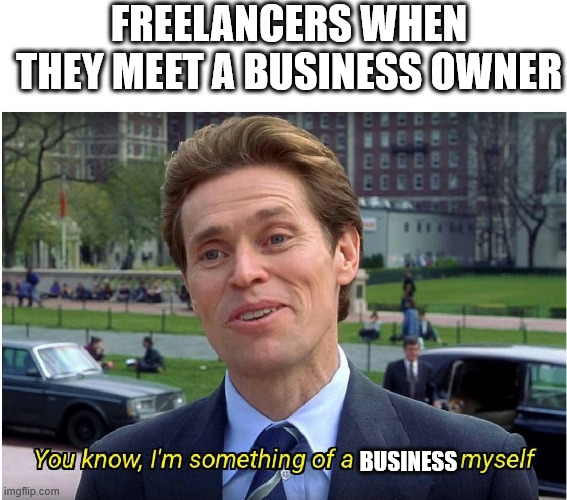7 cringey things freelancers say
Despite being a freelance editor and writer myself, there are some things my fellow freelancers do or say that annoy me to no end.
Adam Woodard
5 min read


As much as freelancers love to complain about bad client behaviour, the truth is we’re just as capable of being unbearable. Examples can range from behavioural patterns and attitudes to simple phrases which cause me to cringe endlessly. Over the years, I’ve encountered enough of these to accumulate a list of pet peeves, which I’m sharing today for your enjoyment.
(1) I'm a solopreneur
Let’s start with an easy one. For tax or accounting purposes, you may be a one-person business as a freelancer. And in many respects, that’s what you’re doing. I also understand the need to blow your own trumpet and make yourself out to be more than you are. We’ve all done this to a certain degree to market ourselves. But sometimes it goes a step too far into cringe territory.
Statements like I’m a solopreneur, or I am my own personal brand are examples of this. Something about it reeks of oblivious LinkedIn lunacy (more on that later). As a freelancer, would I do everything myself because I wanted to or because I’m in love with the grind? No, of course not. And pretending otherwise does me no favours, nor do I think I’d be fooling anyone if I tried.
(2) The client is always right
Now, in principle, I do agree with this statement. A freelancer’s main objective is to meet a client’s expectations or maybe even exceed them. But failing to understand the nuance of this statement or acknowledge that we’re still responsible for what we do can turn this into a thinly veiled excuse for producing cack-handed, sub-par work.
At a certain point, most freelancers are going to encounter requests from clients which are against the client’s interests, or which would result in bad work. Do we just concede that they’re always right? Of course not. Very often, the client has contracted us because we have skills and knowledge they lack. Producing bad work just because they asked for it does nobody any favours, least of all you.
If you encounter a client attempting to go against their own interests, say something. Be diplomatic, but say it nevertheless.
If the client has their head screwed on but is simply mistaken and you say nothing, they’re going to eventually realise that you allowed them to do something stupid and lose trust. If the client is an incorrigible scatterbrain and won’t listen to reason, at least you tried. Odds are you’re probably not going to get through to them anyway and it won’t be long before you part ways (more on that later, too).
(3) That’s not my problem
This is somewhat related to the last point. While it’s important to ensure you’re not taken advantage of, becoming totally inflexible isn’t the solution. It can be tempting to draw a line in the sand and state that everything on the other side isn’t your problem.
But if you want to retain a client and earn their trust, it can be useful to go the extra mile every now and again. That doesn’t mean you become a pushover, so make sure you’re letting them know that you’re going beyond your remit. A good client will recognise this and show their appreciation. But if you sit on your high horse and don't do it, then maybe someone else will.
This is an example of where thinking like a business is the right thing to do. You need to compete and offer more if you want to win and retain clients.
It's up to us to prove our worth to our clients, not settle for the bare minimum and expect praise to be heaped upon us regardless. The same applies to freelancers who say I don’t do revisions. You’re probably not the faultless sigma-male solopreneur you think you are, and you’re going to make mistakes. Be humble. Have some shame.
(4) Pay low rates, get bad work
On a related topic is providing deliberately bad work because you don’t feel you’re getting enough money. It’s your job to negotiate a fair rate for your work. If you fail to do this, it doesn’t mean you then downgrade the work you provide out of spite. That work will be a bad representation of you as a freelancer, which means the only thing you got out of the whole transaction is a smaller amount of money than you wanted.
Either do the work properly, or don’t do it at all. Otherwise, you’re basically retroactively changing the terms of the transaction without informing the client. Sure, don’t go the extra mile in situations like these. But if they don’t acknowledge the quality of your work over time and accept a renegotiation, then it’s probably time to walk away.
(5) LinkedIn
I think a lot of us know exactly what this is about. I acknowledge that LinkedIn can be important for work but, dear God, can we just turn it down a few notches? And I’m especially disappointed in writers, who of all people should know better. There simply aren’t that many visionaries, word wizards, or B2B sales gurus out there for it to be so common on LinkedIn – and even if there were, the amount of fart-sniffing is still too much.
There’s a reason the LinkedInLunatics subreddit has started making its way onto mainstream news sites. The amount of posturing and detachment from reality is becoming concerning and putting people off. It also lowers the bar for everybody else, so please have some shame.
(6) Being too friendly with clients
In another post, I wrote about the (potential) dangers of overly friendly clients. I love having friendly clients, but there’s always a few who ruin it by attempting to use this to get what they want.
But freelancers can be just as guilty of this. Maybe they realise a client is quite friendly and easy-going, and (perhaps inadvertently) start to take advantage of this. Maybe they provide work late and the client is cool with it at first. Maybe they knew the client personally before starting work and assumed they’d get special treatment. Whatever the case may be, this is just dingbat behaviour and a train wreck waiting to happen.
There are already enough difficult clients out there without causing the nice ones to become suspicious and difficult. You’re making it worse for the rest of us. Be grateful for nice clients. Be nice to them.
(7) I fired my client
I saved my (least) favourite for last. I know that a lot of us, and perhaps writers more so, like to be playful with language and subvert how it’s used. But this one makes me cringe more than anything else on this list. How can you fire the person who’s paying you? In what world is that an accurate way of describing what happened?
Maybe some people think this gives them a greater feeling of agency, which is a sentiment I can understand as a freelancer. But a baker who refuses to sell me a loaf of bread hasn’t just fired me, and nor did I fire any of the clients I voluntarily stopped working with.
It has the same air as They didn't break up with me, I broke up with them. This is just semantic manipulation and it makes me cringe.
It should go without saying that this is just a bit of fun and isn't meant to be too serious. We've all said and done silly things at some point and it's healthy to look back and laugh, myself included.


